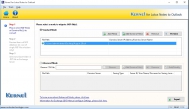
View screenshots
|
Vendor Price: $ 250
License: Shareware
File Size: 10.20 Mb
Version: 15.8
Release Date:
4 Nov 2015
OS: Win2000, Win7 x32, Win7 x64, Win98, WinServer, WinVista, WinVista x64, WinXP, WIn8, WIn8.1, Win10
System Requirements:
Pentium Class Processor, 64 MB RAM, 50 MB
Company: NSF to PST Tool
|
|
Kernel for Lotus Notes to Outlook tool is a smart and intuitive migration utility for migrating NSF files to PST files. You can even try out the free NSF to PST converter to evaluate how the tool performs the migration. The software can even migrate complete Lotus Notes mailboxes (including its data like emails, contacts, drafts, notes, tasks, calendar items, journals etc.) to PST files. Besides, the option to move NSF to PST, Kernel for Lotus Notes to Outlook provides the facility to save NSF files to PST, RTF or TXT format.
To convert NSF files to PST files, the software uses dual migration modes, i.e. Standard Mode and Advanced mode. The standard mode is proficient to convert multiple number of files from NSF files to PST files. This exclusive utility can perform these conversion facilities, like NSF to PST conversion, NSF to Exchange Server, Domino Server files to PST files and Domino Server files Exchange Server. However, in advanced mode, user has to create CSV files in order to migrate multiple NSF files to PST files or Exchange Server in a single attempt.
The free NSF to PST converter is embedded with smart filter options like set date range & exclude all folders, which allows you to save only what you want. Also, the users can even modify the name of Outlook folder when migrating. The data items are migrated with complete integrity while preserving formatting, structure, & properties of the original files. Kernel for Lotus Notes to Outlook software uses interactive GUI design that provides self-explanatory environment that could be operated by non-technical users with complete ease. This free NSF to PST converter is ready for use for all versions of Domino Server (9.0.1/9.0/8/7/60), Lotus Notes Domino Server (8.5, 8.0, 7.0, 6.5, 6.0), Exchange Server (5.0, 5.5, 2000, 2003, 2007, 2010, 2013), MS Outlook (97, 98, 2000, 2002, 2003, 2007, 2010, and 2013) and Windows platforms (Windows 8, 8.1; Windows Server 2012).
|

